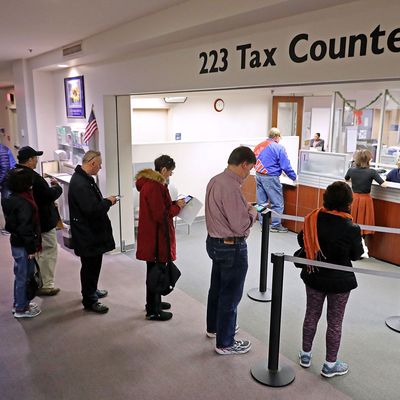
The Republican Party can’t live on the dollars of libertarian billionaires and the votes of downwardly mobile white reactionaries alone. Without the support of culturally moderate, but fiscally self-interested suburban homeowners, the GOP’s congressional majorities would cease to exist. Highly educated, highly affluent blue-state suburbs put the Speaker’s gavel in Paul Ryan’s hand — and he then used it to pare back one of their favorite tax deductions.
There’s been a lively debate in recent days about whether the GOP’s deeply unpopular tax bill will become more — or less — politically toxic between now and the 2018 midterms. Pessimistic progressives contend that once voters realize the legislation reduces their short-term tax burden, they’ll view it more fondly. Others argue that the stench of corruption that clings to the bill will prove more potent than its meager middle-class benefits.
Ultimately, though, the tax bill’s standing with the general public may matter less than the extent of its appeal with a small, but electorally critical, number of college-educated suburbanites. Most voters have better reasons to support or oppose the Trump-era GOP than the tax bill’s immediate effects on their bank accounts. But some homeowners in Nassau County may not.
In 2015, the average state and local tax deduction (SALT) taken in that county came in at over $20,000. The GOP tax bill caps that deduction at $10,000. Homeowners in high-tax enclaves all across the United States are facing similar losses from the GOP’s SALT cap. This, by itself, could be enough to push a critical mass of moderate Republican voters into Team Blue’s column in 2018. But the injury of the SALT cap is all the more explosive for the insult that Paul Ryan paired it with: The Trump tax cuts don’t just strip a valuable deduction from a core Republican constituency, they also leave members of that constituency with only a single week to adjust their financial planning — specifically, the week between Christmas and New Year’s Day.
In other words, Republicans just increased many of their voters’ state and local tax burdens, and then ruined their holiday seasons to boot.
And ruined is not too strong a term. Well-off homeowners across the country spent the past week fighting for their tax planners’ attentions; waiting in long lines to prepay their 2018 property taxes, in hopes of getting in one last, unlimited deduction before the new rules take effect — then learning that those prepaid taxes might not actually be deductible, anyway.
In recent days, state and local officials in high-property-tax states — including New York governor Andrew Cuomo and New Jersey aspiring sportscaster Chris Christie — encouraged residents to prepay their 2018 property taxes, as a means of escaping the Republican tax bill’s harms. Penny-pinching professionals scrambled to heed this advice. Then, on Wednesday night, the IRS announced that taxpayers can only deduct such property taxes if those taxes were assessed before 2018. In other words, payments based on one’s estimated property-tax burden next year would not qualify for the deduction — only those based on an official 2018 assessment would. But different states and localities conduct their official assessments on different timetables — Washington D.C. set its 2018 property-tax rates back in October, while nearby Arlington County, Virginia, won’t put its in place until April.
Furthermore, the IRS’s guidance doesn’t define “assessed” — an oversight that’s proven confounding for New Jersey residents. As Bloomberg explains:
By state law, a New Jersey property assessor “shall determine his taxable valuations of real property as of October 1 in each year” – language that sounds promising for would-be tax cutters. But the same statute holds that the assessor “shall complete the preparation of his assessment list by January 10.” Ultimately, the “final assessment” is to be completed by May 5.
Meanwhile, in Westchester County, taxpayers are feeling enraged and confused. As the New York Times reports:
Steve Halliwell, who lives with his wife, Anne, in Irvington, a village in Westchester County, N.Y., began asking town officials several weeks ago about paying next year’s property taxes this year. Mr. Cuomo’s executive order last week was meant to make that possible.
But the order came too late for the county’s residents: Officials there said this week that they would not be able to issue tax assessments by the end of the year.
“There are a lot of angry people here because they feel powerless and they are not used to feeling powerless,” Mr. Halliwell said.
Now, it’s possible that Mr. Halliwell and his peers will ultimately benefit from the GOP tax bill — or, at least, break even. The legislation will cut the top marginal tax rate and boost returns to owners of corporate stock — measures that should benefit many Westchester residents.
But for some erstwhile Republican voters, the experience of spending the Christmas season frantically trying to navigate state and local bureaucracies — because GOP lawmakers pared back their tax deductions to give giant breaks to the superrich, while leaving them virtually no time to adjust — will surely loom larger.
These people aren’t used to feeling powerless. And that’s very dangerous for those in power.






























